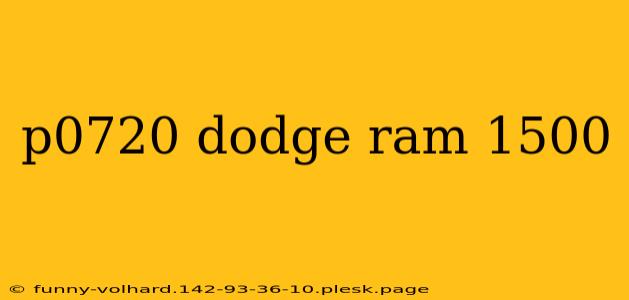The dreaded check engine light. For Dodge Ram 1500 owners, seeing that illuminated symbol can trigger a range of anxieties, especially when the accompanying diagnostic trouble code (DTC) is P0720. This code points to a problem with the output speed sensor (OSS), a crucial component in your transmission's ability to function smoothly. This comprehensive guide will help you understand what the P0720 code means, potential causes, troubleshooting steps, and what you can expect from repairs.
Understanding the P0720 Code: What it Means
The P0720 code signifies a malfunction in the output speed sensor circuit. This sensor plays a vital role in monitoring the rotational speed of the output shaft of your transmission. The engine control module (ECM) relies on this information to precisely control shifting, torque converter lockup, and other critical transmission functions. When the ECM detects a problem with the OSS circuit – be it a faulty sensor, wiring issue, or other electrical problem – it sets the P0720 code, and the check engine light illuminates. This doesn't necessarily mean your transmission is completely dead, but it does indicate a serious issue that needs immediate attention to prevent further damage.
Common Causes of P0720 in a Dodge Ram 1500
Several factors can contribute to the P0720 code appearing on your Dodge Ram 1500's diagnostic system. These include:
1. Faulty Output Speed Sensor (OSS):
This is the most common culprit. The sensor itself can fail due to wear and tear, exposure to the elements, or simply age. A failing OSS may provide inaccurate or intermittent signals to the ECM.
2. Wiring Issues:
Damaged, corroded, or loose wiring in the OSS circuit can disrupt the signal flow to the ECM. Inspect the wiring harness carefully for any signs of damage or corrosion. This includes checking the connections at both the sensor and the ECM.
3. Transmission Problems:
In some cases, the P0720 code might be a symptom of a more significant underlying transmission problem. This could include low transmission fluid, internal transmission damage, or other mechanical issues within the transmission itself.
4. ECM Issues (Less Common):
While less frequent, a malfunctioning ECM can also contribute to the P0720 code. This is typically diagnosed through further testing and often requires professional assistance.
Troubleshooting the P0720 Code: A Step-by-Step Approach
Before rushing to replace parts, systematic troubleshooting can save time and money. Here's a suggested approach:
1. Check the Transmission Fluid:
Low or contaminated transmission fluid can affect sensor readings. Check the fluid level and condition. If low, top it off with the correct type of fluid specified in your owner's manual.
2. Inspect the Wiring:
Carefully examine the wiring harness connected to the output speed sensor. Look for any signs of damage, corrosion, or loose connections. Repair or replace any damaged wiring.
3. Test the Output Speed Sensor:
This typically requires a multimeter and some technical knowledge. You can consult a repair manual specific to your year and model of Dodge Ram 1500 for detailed instructions on testing the OSS. Replacement is often straightforward once the old sensor is removed.
4. Professional Diagnosis:
If you're uncomfortable performing these checks, it's best to seek professional help from a qualified mechanic. They have the tools and expertise to diagnose the problem accurately and perform necessary repairs.
Repairing the P0720 Code: What to Expect
Repair costs will vary depending on the root cause of the problem. Replacing the OSS is relatively inexpensive compared to more extensive transmission repairs. However, if the problem stems from internal transmission damage, the repair costs can be significantly higher.
Preventing Future P0720 Codes
Regular maintenance is key to preventing future issues with your Dodge Ram 1500's transmission. This includes:
- Regular Transmission Fluid Changes: Follow the recommended fluid change intervals in your owner's manual.
- Regular Inspections: Have a mechanic inspect your transmission during routine maintenance checks.
By understanding the causes, troubleshooting steps, and potential repair costs associated with the P0720 code, you can be better prepared to address this common issue and keep your Dodge Ram 1500 running smoothly. Remember to consult your owner's manual and seek professional help when necessary.

